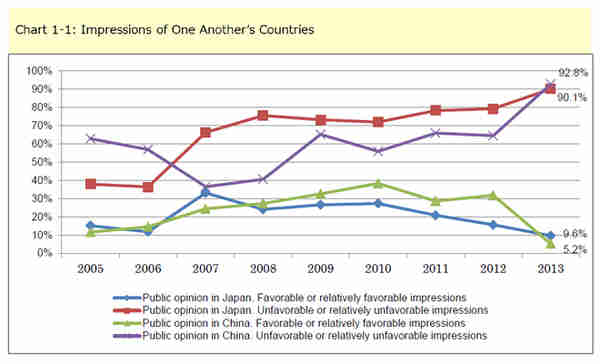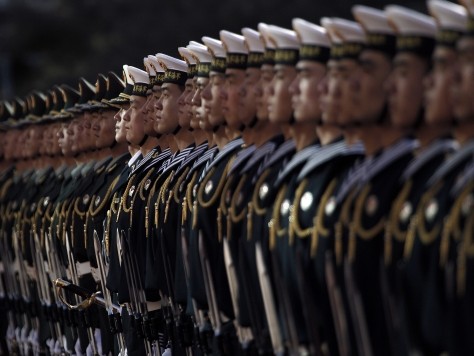
This morning’s key headlines from GenerationalDynamics.com
- China and Japan really DO hate each other
- Echoing 1938, Britain gives a pass to Syria’s Bashar al-Assad
China and Japan really DO hate each other

Japan-China mutual attitudes, 2005-2013 (GenronNPO)
A survey conducted for the last nine years shows that in the lastyear, the mutual public hatred between the Japanese and Chinese peoplehas reached critical levels. In the latest survey, 90.1% of Japanesehad unfavorable impressions about China, while 92.8% of Chinese hadunfavorable impressions about Japan.
The report blames it on the dispute over the Senkaku/Diaoyu islands,but that doesn’t take into account the centuries of hatred between thetwo people. The Chinese people have repeatedly made it clear thatthey’re seeking revenge for Japan’s genocidal actions prior to andduring World War II, especially the 1937 Nanking (Nanjing) Massacre,and the use of Chinese “comfort women” by the Japanese soldiers duringthe war.
From the point of view of Generational Dynamics, the sharp increase inmutual contempt between the two populations since 2005, especially inthe last year, is caused by the disappearance of the generations ofsurvivors of World War II. For them, WW II was so horrible that theywere traumatized for life, and have devoted their lives to make surethat nothing so horrible happens again. But now those survivors arealmost gone, leaving behind younger generations growing up after thewar, with no personal memories of the horrors of the last war betweenJapan and China. These younger generations have no personal memoriesof the horrors of the last war, and so they have no fear of the nextwar, and no clue what’s going to happen to them. GenronNPO and China Daily and The Diplomat
Echoing 1938, Britain gives a pass to Syria’s Bashar al-Assad
In a major political victory for Syria’s psychopathic president Basharal-Assad and his psychopathic arms supplier, Russian presidentVladimir Putin, Britain’s House of Commons on Thursday eveningrejected any military action in response to al-Assad’s repeated use ofchemical weapons against his own citizens.
The vote is a major defeat for prime minister David Cameron,who said:
“I strongly believe in the need for a tough responseto the use of chemical weapons, but I also believe in respectingthe will of this House of Commons. It is very clear tonight that,while the House has not passed a motion, it is clear to me thatthe British parliament, reflecting the views of the Britishpeople, does not want to see British military action. I get thatand the government will act accordingly.”
The vote throws Cameron’s own political future into doubt. During thedebate, Cameron called attention to a contradiction in the argumentsused against him. On the one hand, some asked why he was rushing intomilitary action, when the chemical weapons attack occurred only lastweek, while others pointed out that there had been 14 previous(smaller) chemical weapons attacks, so why now? However, others saidthat after the experience of going to war in Iraq based onintelligence that turned out to be faulty, they were simply unwillingto support any military intervention under any circumstances.
The rejection is reminiscent of the free pass that Britain’s primeminister Neville Chamberlain gave to Adolf Hitler for the Naziinvasion and annexation of the Sudetenland region of Czechoslovakia in1938, announcing that Hitler promised “Peace in our time.”
Far from preventing war, Chamberlain’s free pass convinced Hitler thatBritain was too weak to oppose his “Lebensraum” policy, and Britainand the Nazis were at war a year later.
In the current situation, Western weakness, combined with al-Assad’sand Putin’s aggressive Sunni extermination plans, have alreadytremendously inflamed the entire Mideast, as al-Qaeda linked jihadistsfrom Pakistan to Nigeria to Dagestan have been traveling to Syria tofight al-Assad’s Shia/Alawite forces, and also to Iraq, where thenumber of deaths from terrorist acts targeting Shias has beenskyrocketing. The actions of these two psychopaths have caused thedeaths of 100,000 Syrians, almost all civilians, as well as millionsof refugees, over a million of which have flooded into neighboringcountries. The vote in Britain can only make that situation worse.
Britain’s rejection was apparently a surprise to everyone, includingthe White House. Caitlin Hayden, a spokesman for the White House andNational Security Council said in a statement:
“As we’ve said, President Obama’s decision-making willbe guided by what is in the best interests of the United States.He believes that there are core interests at stake for the UnitedStates and that countries who violate international normsregarding chemical weapons need to be heldaccountable.”
Some analysts believe that time is now working against PresidentObama, and if he is going to take some action, it will have tobe this weekend, for two reasons. First, international willto take action is weakening with time. And second, Obamawill be traveling to Russia next week for the G20 meeting.
President Obama has painted himself into a corner. He’s repeatedlysaid that use of chemical weapons was a “red line,” and that al-Assadhad to “be held accountable.” Britain’s rejection is already ahumiliation for Obama and the United States, and if al-Assad ispermitted to get away with using chemical weapons to slaughter massesof his own civilians with no accountability, it will represent a majorhumiliation for the West, and will set the stage for a major war, justas surely as Chamberlain’s “Peace in our time” message did in 1938.Unfortunately, sending a few missiles into Syria with no permanenteffect on the war will have the same effect. CBS News and Atlantic Wire
Permanent web link to this article
Receive daily World View columns by e-mail

COMMENTS
Please let us know if you're having issues with commenting.